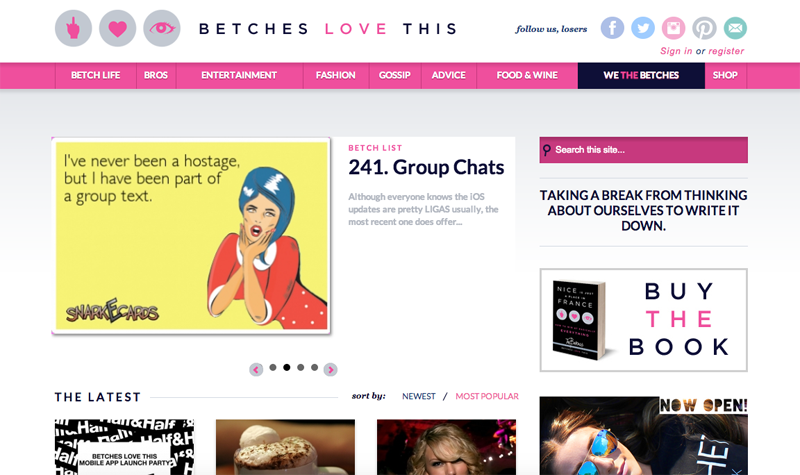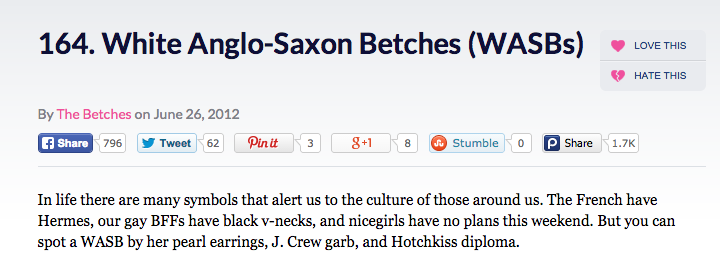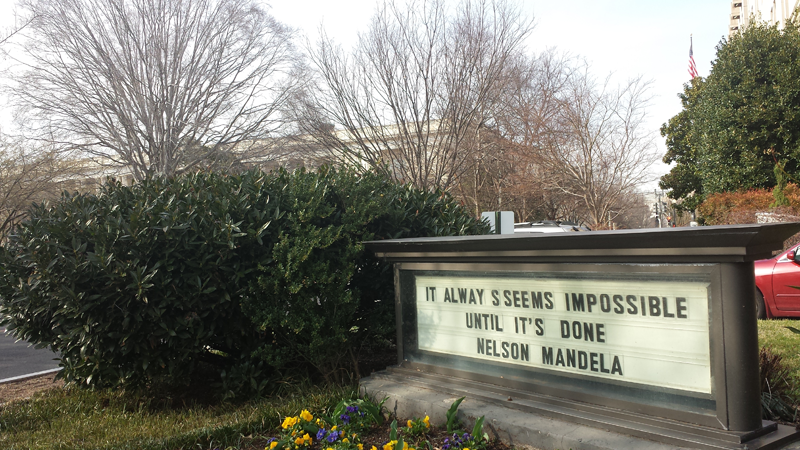“Wow—you’ll be just like those girls on The Hills.”
That is what my professor said when I told him that I wanted to be a writer. My role models are Gloria Steinem and Anderson Cooper, but I usually elicit other assumptions with my blonde hair and occasional West Coast intonation. I was raised in Scottsdale, Arizona—a place that had its own section on Wikipedia’s “Valley Girl” page—by a New Yorker father and another desert girl who never fit in. I was a cultural unicorn of sorts. I never identified with the majority of my peers, but this isn’t a bullying story. The evolution of a cultural virus, The Rise of the Betches, happened in a land not too far from where I grew up—Los Angeles—and spread east, before exploding universally through the internet.
The term betch has evolved from simply a mispronunciation of bitch to both a cyber and real-life culture. It first entered popular culture in 2005’s viral hit “Shoes,” a satirical song by a male comedian in drag. Beginning in 2010, the word went viral with websites like “Betches Love This,” “What Should Betches Call Me,” and dozens of blogs attempting to replicate the two, letting shallow mean girls everywhere reclaim betch as a badge of honor. Greek letters are mandatory; unhealthy eating habits and body image are encouraged. Us Weekly and Star are suggested reading, and violators will be shunned due to guilt by association. The rules are laughably ridiculous to anyone with a set of democratic values, rather than that of an oligarchy. Apparent not only in Mean Girls, viral YouTube videos, and online communities, betches have stepped outside the screen and are permeating the real world. In addition to the promotion of bullying and superficiality, betch culture reinforces capitalist ideas like consumerism and social stratification to a point where these values become dangerously unquestioned. The betch brand is successful because it exploits existing frameworks of preference while masking consequences with humor.

In the beginning—and by that I mean pre-betch era 2004-2008—there were just baby betches consuming mean-girl media but not contributing. Despite the ultimate anti-bullying message of Mean Girls, the film has permeated popular culture so deeply that it ranks highly on multiple “Top Most Quotable Movies” lists. “Shoes” by Kelly might have highlighted the horrors of consumer-driven youth, but the (admittedly honest) humor undermines the larger issues that it presents. This same phenomenon is present in Summer Heights High and Private School Girl’s Ja’mie King, who is one of the most ignorant, politically incorrect characters in media (“I’m the smartest non-Asian in Year 11,”) and yet, the satire of the show has been completely lost on the population of betches that identify with her and use her—as well as characters from Mean Girls, The Hills, and other works geared towards young women—as a justification of their behavior.
Mean Girls, MTV reality dramas like The Hills, and satires like Ja’mie King inspired the creation of blogs like “What Should Betches Call Me” and “Betches Love This,” as evidenced by the frequent use of GIFS from these mediums to express ideas. The convergence of film, television, and the internet in these scenarios suggests that betchiness is more of a new philosophy within popular culture than an identity, as these characters stem as far back as your mom’s stories about high school mean girls. What has changed recently is that betches are proud to be the girls everyone hates because they view it as a reflection of superiority. Yesterday’s bitches would deny their bitchiness to the death, masking it with false empathy while identifying markers of beauty, wealth, and popularity as independent factors that function independently to make them more fortunate. Betches today differ in that not only do they strive to dominate social structures through beauty, wealth, and popularity, but they also value their lack of compassion for others like a weapon in wartime. They recognize that this lack of empathy and criticism of others keeps them strong, and are proud to promote their values on a massive scale.
In addition to promoting superficiality and ostracization of peers, betch culture also encourages blind consumerism and perpetrates the most detrimental effects of capitalism in a positive light (i.e. social stratification). Both are exemplified by Important Item #179 on The Betch List (basically like a code of conduct) on “Betches Love This.” The entry, “Expensive Work-Out Clothes,”reads, “Obviously this means you’ll need to acquire a multi-colored collection of sneakers, as every true betch knows that wearing a mismatching gym outfit is a clearer sign than knockoff Chanel earrings that you’re fucking poor.” This promotion of excessive consumption of goods simply as a status symbol is a trope throughout betch culture.
By promoting consumption out of want rather than need, betch culture reinforces a skewed set of priorities rooted in materialism and a sense of entitlement that alienates others. The aversion to appearing or being of a lower socioeconomic class in this quote not only reflects the defining elitism of the culture, but it also exemplifies its superficiality and lack of substance. This superficiality is presented through the notion that a betch would judge someone’s class based on whether or not their clothes match, which is trivial to anyone outside betch culture. Individuals outside betch culture might identify impoverished individuals through condition of clothing (whether it’s dirty or tattered—not the brand name), the presence of mannerisms signaling mental illness, linguistic ability, etc. Clothing condition compares appearance to a universal standard for cleanliness as opposed to a socially approved brand name. Mannerisms signaling mental illness and linguistic ability are rooted internally. Together, external and internal cues reflect a more accurate interpretation of the world, and in comparison to what betches consider indications of poverty, a more intellectual and informed interpretation. Furthermore, the use of explicit language to preface “poor”also reflects a lack of sympathy for those in less fortunate circumstances while reaffirming the betch value of remaining socioeconomically dominant. In short, betch culture promotes the polarized class system of capitalism, blind consumerism, and ignorance of larger world issues.
In addition to assaulting the lower classes, betch culture adopts an archaic perspective on race and gender—the latter of which is highly ironic for a site with a primarily female demographic. Betches emphasize the importance of finding a wealthy husband while downplaying the value of education to merely a MRS (Mrs.) degree. Betch culture certainly isn’t feminist, and the quasi-girl power tone of “Betches Love This” doctrine is just manipulation in disguise.
By definition, a man cannot be a betch. There is an absence in everyday vernacular describing a materialistic, self-centered, ignorant man. The closest the English language comes to encapsulating the same ideas is with jerk, douchebag, or bro, but even those terms aren’t as vividly defined as the term betch. Subsequently, the absence of a linguistic equivalent implies that men are incapable of being materialistic, self-centered, or ignorant, which is inherently inaccurate. Similar to the language differences when discussing male and female sexuality—as men are players when they are promiscuous, while women are sluts when they do the same—the gendered nature of the term betch promotes the social stratification of the sexes.
Sexism is concretely evident in betch culture through the emphasis on dating wealthy men instead of searching for deeper emotional connections. This obsession with marriage, as well as the disregard of higher education for the sake of learning rather than Greek life or professional development, promotes the financial dependency more reminiscent of 1950s gender roles than the vast opportunities available for women today. College as a guide to “getting your MRS”or “Mrs. Degree”is clearly exemplified in Betch List item #164, “White Anglo-Saxon Betches.”The Betches write, “For college, the WASB goes to schools like UVA, Yale, Vanderbilt…where she joined a sorority and likely followed in her mother’s footsteps and majored in something totally marketable, like being a republican’s wife.” What is ironic about this statement is that despite attending what are arguably some of the best colleges in the country, betches do not value the deeper educational value of these institutions, but the desirable brand-name of these colleges in terms of gaining a life partner—or caretaker rather. The specific reference to the Republican Party—which promotes social stratification by both classes and sexes—parallels the economic and gender values found in betch culture.

The lack of purpose for betches as a whole was even identified by Kathy Lee Gifford when Betches Love This founders Jordana Abraham, Samantha Fishbein, and Aleen Kuperman appeared on Today to promote their book. Gifford goes as far to ask them why they aren’t “contributing members of society,” a nod to the fact that these ladies all went to Cornell and have only managed to turn middle school politics into a profitable enterprise—instead of curing cancer, running a nonprofit, or creating products that people actually need. Abraham, Fishbein, and Kuperman stumble through the interview, clearly trying to remain honest about their projects without looking like assholes on television. Laughing uncomfortably in several parts, the Betches are clearly caught off guard by Gifford’s frank implication that the women are nothing to praise. Cornell women creating nothing of value, the Betch founders directly embody their convoluted perspective on educated women. This is not satire for them. This is real life, and Betches Love This is the next step of the waiting game for women who failed, yet are still aspiring to get their MRS.
Ironically, this urgency to submit to husbands contradicts the “girl power” tone of the Betches’ core manifesto. When providing their own definition of the term betch, they write, “Betchiness [is] about gaining success in a man’s world while still being hot and fun and envied.” This statement suggests that the betches are motivated to make it their world instead of a man’s world; however, the frequent emphasis on finding a husband throughout betch culture completely undermines this message. Upon further reflection, it appears as though gender roles within betch culture operate on laziness. Items in The Betch List like “Getting Shit Now”and “Over Reacting” illustrate betches as power hungry, yet used to having whatever they want simply given to them.
Betch culture promotes marriage while neglecting education and career because it is simply easier to have every desire met by a rich husband than to work. Inherently, this ideology cannot be described as any kind of feminism because feminism promotes equality between the sexes and attempts to overturn gender expectations. Betch culture promotes these socially implemented “requirements”of women and excludes anyone who deviates from them, while promoting inequality.
In addition to lowering the stance of women, betch culture makes assaults on the status of racial minorities. While the women of “Betches Love This” insist that betchiness“has nothing to do with race, ethnicity, religion, or the natural frizziness of your hair,” their readiness to single out minority groups illustrates them as falsely accepting.
The discussion of class in conjunction with race also aligns betch culture with biological determinism and suggests that while betches insist they are not prejudiced, they still ultimately view anyone that isn’t a WASB (white, Anglo-Saxon betch) as different, and subsequently inferior. The racial hierarchy in betch culture is not facilitating new prejudices as much as it is reflecting existing racism within American popular culture. Like betch culture, America supposedly embraces people of all races, religions, and classes. With the most volatile issues of the nation surrounding immigration reform and profiling Muslim Americans, can America be truly considered an accepting country? What about the racist stereotypes promoted in modern television shows, movies, and video games? Betches mimic the colorblind racism present within American culture at large, a process identified by sociologist Leslie Carr that consists of condemning racism while inadvertently exerting white dominance. Considering these issues, the racist nature of betch culture is not surprising, but rather an honest depiction of America’s ambivalent attitude towards race and prejudice in mainstream culture.
While the fellow media has not held “Betches Love This” accountable for their cultural insensitivity, the site has received backlash for promoting negative body image and destructive behavior. In response to a particular article titled “How To: Get People to Accuse You of Having an Eating Disorder,”the leaders of the site received hundreds of angry comments from readers and a letter citing the article as the reason her friend had abstained from eating for two weeks, according to an article from The New York Times. The Betches removed the article from their site, but continue to emphasize unrealistic weight loss in their posts. The same article quotes head betch Samantha Fishbein defending their choices: “I can’t feel responsible for every girl who feels like she needs to be 90 pounds because we made a joke.”
The power of betch culture cannot be discounted with the dismissive identification of it as a “joke”—a defense frequently used when bullying becomes more serious than just teasing in the school-yard and results in the death of a tormented teen. The Times also spoke to Sarah Kersh, Professor of Women’s Studies and English at Vanderbilt University for her thoughts on betch culture. “I think it tends to blur the line between humor and reality,” she said. Kersh, who discusses “Betches Love This” in her English “Feminism and Film” course, continued: “I just see it recapitulating stereotypes about women, cruel and unattainable standards and, above all, unquestioned heteronormativity.”6 Heteronormativity is the most concerning repercussion noted by Kersh, namely because it is only possible for certain members of the population to be “normative.” Women of color and lower socioeconomic classes are marginalized without question, while women of differing sexual orientation or religion are encouraged to abandon these concealable attributes and assimilate. This heteronormativity is dramatically impacted by the blur between humor and reality mentioned by Kersh. Heteronormativity within betch culture goes “unquestioned” primarily because it is contextualized by humor. The offensive nature of these comments is by no means masked by comedy, but rather convoluted by it; betch culture has endured simply because it is funny, and audience members would rather laugh along with the joke than address its fundamental flaws. Betch culture inherently exploits peer pressure and the timeless struggle to “fit in” to gain momentum.
Kersh’s concerns are echoed among the target audience for “Betches Love This.” “Online sensations like ‘Betches Love This’ and ‘White Girl Problems’ encourage young women to get skinny at any cost. Their audiences, mainly college-age women, bring this weight fixation to campus,”wrote Wake Forest University student Annie Johnson in a campus newspaper article about Adderall abuse for weight loss. Johnson’s concerns demonstrate the true power of betch media and the extent to which it has infiltrated the real world. Johnson is discussing women with the education and resources to realize that these views are inherently offensive and destructive, yet still subscribe to them. The power of betch culture has damaged a group privileged enough to “just say no,” but also vulnerable enough to absorb a culture holding self-esteem as ransom, as evidenced by recent criticism over “skinny” brands like Brandy Melville and Abercrombie & Fitch.
The repercussions of betch culture for young women—sucked in by ignorance or self-doubt—are clear. Betch cyberculture reflects and justifies larger issues of materialism, insensitivity, ignorance, and social stratification. Mean girl behavior aside, betch culture impacts the lives of young women in ways as concrete as eating disorders and drug abuse, while discussing racial and economic issues in ways that will only increase inequalities among groups. While the head betches might disregard their influence as simply a “joke”that has been misinterpreted, the most volatile members of their audience are clearly not “getting it,”and that in itself is a reason to distinguish between positive humor and humor that thrives on an “us-vs.-them, skinny equals pretty”mentality.
Betch culture is not simply a passing fad, as the internet cannot be simply confiscated from use by idiots. However, for every Kim Kardashian and Lauren Conrad, there is a Lena Dunham or Emma Watson willing to define the female identity with gravity, intelligence, and consideration. Though the majority of women will be excluded from the betch culture by its exclusivity, the dominance of the culture turns these values into a greater threat for all people. The task at hand in managing betch culture lies in addressing the status quo and showing zero tolerance for racism or classism within any facet of society—not just betch culture. The endurance of institutionalized racism and blind capitalism serves as the justification for prejudice within betch culture, while drawing more individuals into the culture by reflecting dramatizations of prevalent intolerance. Betch culture is a symptom of larger discrimination, but nevertheless facilitates it by normalizing politically incorrect and offensive behavior.
What is next for women functions both on macro and micro levels? Culturally, curbing betch culture begins with drawing a firm line between parody and reality, while shifting media emphasis from beauty and wealth to women with valuable attributes to offer. These ideas must occur on a familial basis as well. Instilling self-esteem in young girls based on personality attributes rather than physical ones is key to creating individuals who do not find pleasure in marginalizing others. Betch culture robs society of a potentially advantageous resource and makes it parasitic.
Bibliography
“#117: The Token Asian Betch.” Betches Love This. 31 Oct. 2011. http://www.betcheslovethis.com/article/token-asian-betch.
“#143: Jewish American Betches.” Betches Love This. 18 Sept. 2012, http://www.betcheslovethis.com/article/jewish-american-betches.
“#150: Country Clubs.” Betches Love This.11 Apr. 2012. http://www.betcheslovethis.com/article/country-clubs
“164. White Anglo-Saxon Betches (WASBs).” Betches Love This. 26 June 2012.
http://www.betcheslovethis.com/article/white-anglo-saxon-betches-wasbs.
“179. Expensive Work Out Clothes.” Betches Love This. 18 Sept. 2012.
http://www.betcheslovethis.com/article/expensive-workout-clothes.
“About Betches.” Betches Love This. Betches Love This, n.d. Web. 10 Oct. 2013.
Carr, Leslie. “Colorblind” Racism. New York: Sage Publications, 1997.
Tina Fey, Mean Girls, Film, 97 min. 2004, www.julep.com%2Fblog%2Fnational-mean-girls- day%2F&ei=oO89VM75IIePsQT9l4LICQ&bvm=bv.77412846,d.cWc&psi.
Johnson, Annie. “Students Abuse Adderall for Weight Loss.” Old Gold and Black. 11 Oct. 2013. http://oldgoldandblack.com/?p=36164.
Lilley, Chris, Summer Heights High, Television, 22 min, 2007, http://static.entertainmentwise.com/gallery/5987732_tumblr_m2kuy5vPTV1rs55b4o1_50 0.gif.
Lilley, Chris, Summer Heights High, Television, 2007, http://24.media.tumblr.com/tumblr_mbcnx7HNR91rtgzofo1_500.png.
Lilley, Chris, Ja’mie: Private School Girl, Television, 2014, vulture.com.
Seacrest, Ryan, Keeping Up with the Kardashians, Television, 22 min, 2011, http://cdn4.teen.com/wp-content/uploads/2012/10/keeping-up-with-the-kardashians- jail.gif.
Seglison, Hannah. “Laughing All the Way to the Bank.” The New York Times. 26 June 2013.
Weiner, Mathew, Mad Men, Television, 2007, http://calitreview.com/wp-content/uploads/2010/09/betty-draper1.jpg.
Context Links:
Here is the Betches Love This Twitter page.
An article in Jezebel discussing the Betch culture.
Here is a piece explaining the supposed satire of Betches Love This.
:::
 Born and raised in Scottsdale, Arizona, Morgan Gilbard attends Hobart and William Smith Colleges in upstate New York. Gilbard is majoring in English, while minoring in political science and media studies. She served as Editor-in-Chief of the campus newspaper, The Herald, for two years and is currently working on her honors thesis on anti-Semitism in German fairytales. Gilbard hopes to pursue graduate study in journalism.
Born and raised in Scottsdale, Arizona, Morgan Gilbard attends Hobart and William Smith Colleges in upstate New York. Gilbard is majoring in English, while minoring in political science and media studies. She served as Editor-in-Chief of the campus newspaper, The Herald, for two years and is currently working on her honors thesis on anti-Semitism in German fairytales. Gilbard hopes to pursue graduate study in journalism.



